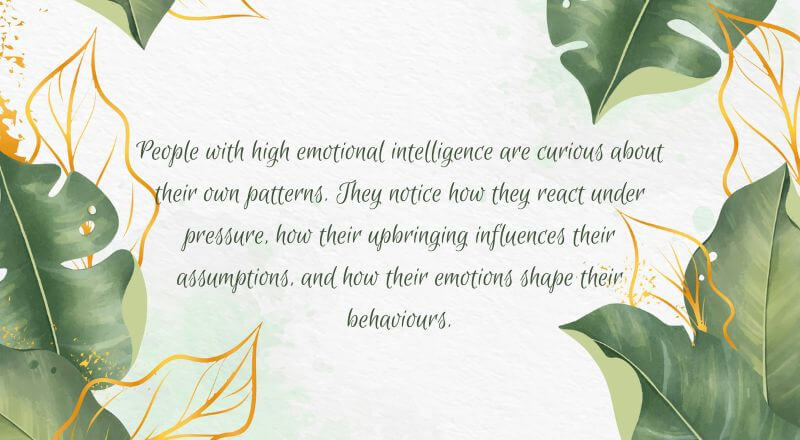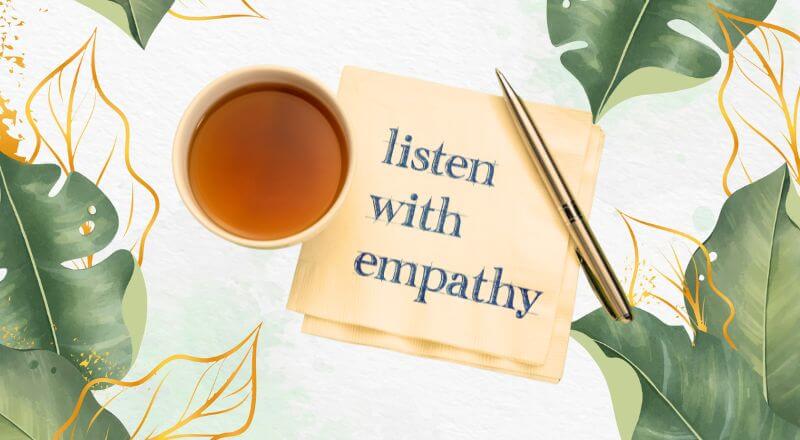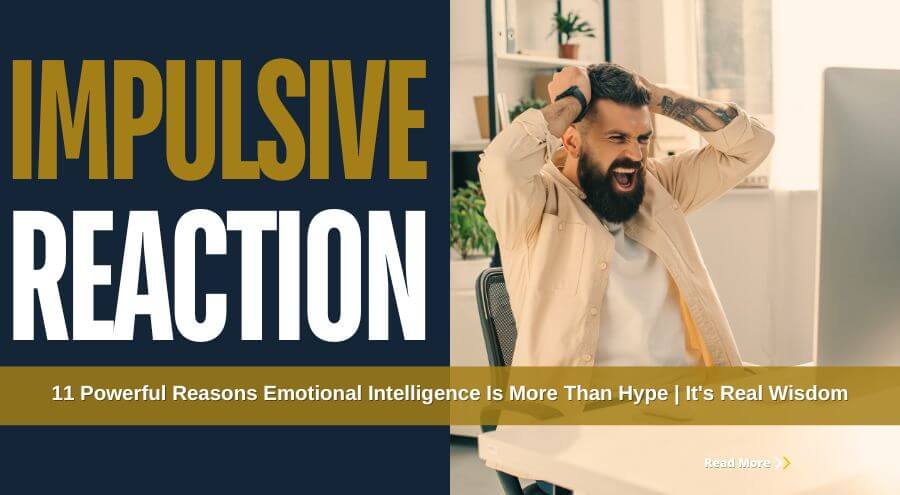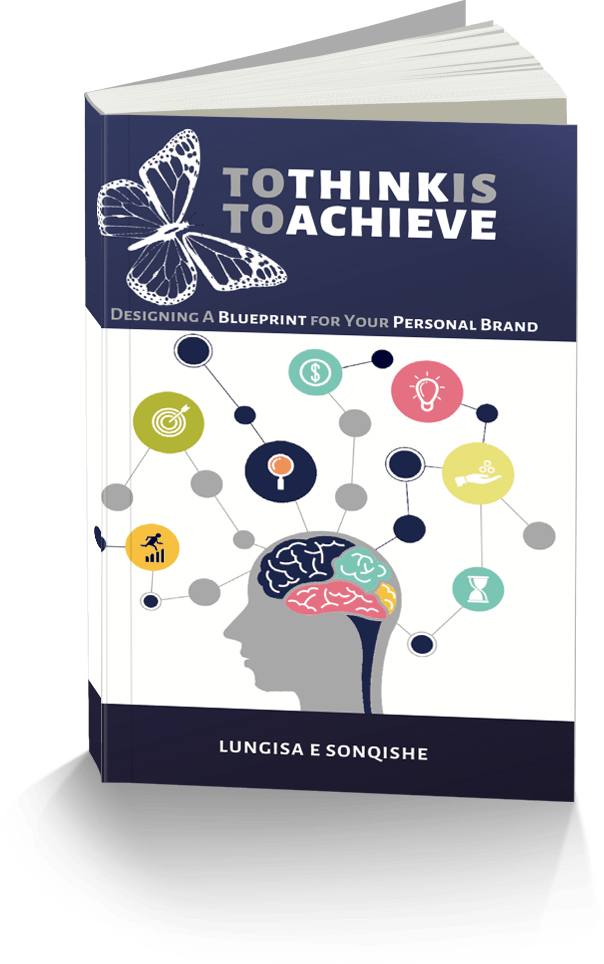Table of Contents
Impulsive Reaction and How Emotional Intelligence is True Wisdom
Introduction: From Impulse to Insight
We are often put in situations where we find ourselves becoming increasingly reactionary. A message arrives, a headline flashes, a colleague misspeaks, and before we breathe, we respond, sometimes regrettably. In a culture that prizes speed, impulsivity often appears to be a virtue. But what if real power is in pausing, not reacting?
Emotional intelligence is often dismissed as mere jargon. Yet, look closer and you’ll see it’s the foundation of self-awareness, connection, and thoughtful choices, wisdom in action.
Raw intellect can solve problems. Emotional intelligence, though, understands the people behind those problems. It equips us to navigate tension without escalating it, to lead without dominating, and to live without burning out.
This article examines 11 compelling reasons why emotional intelligence is not just a buzzword, but a subtle and consistent form of everyday wisdom. And in a reactive world, it may be one of the most underrated superpowers we have.
Here Are the 11 Reasons Emotional Intelligence is True Wisdom

1. Awareness Prevents Reactivity
Self-awareness, one of the foundational elements of emotional intelligence, lets you recognise what you’re feeling, when you’re feeling it, and why. This may sound simple. In practice, it’s profoundly powerful. Most of us move through our days on autopilot, emotionally reacting to people or events. Rarely do we pause to reflect on what’s really going on inside.
Self-awareness creates a gap between what happens and how we respond to it. That gap is where growth, maturity, and wisdom live. When we can name our emotions, such as frustration, anxiety, jealousy, and overwhelm, we reclaim agency. We’re no longer held hostage by them.
For emotionally intelligent individuals, awareness becomes a shield against reactivity. Instead of snapping, they step back. Instead of sulking, they investigate. The goal isn’t to suppress feelings; it’s to acknowledge them, then decide what comes next. That is wisdom at work.
2. Emotional Regulation Builds Resilience
It’s easy to look composed when everything’s going your way. But the true test of character is how you respond when life gets messy. Emotional regulation, the ability to manage your emotional responses rather than be controlled by them, is what turns challenges into lessons and stress into strength.
An emotionally intelligent person doesn’t deny or bottle up their emotions. Rather, they process them consciously. They understand that feelings are information, not instructions. Just because you feel anger doesn’t mean you must shout. Just because you feel fear doesn’t mean you must flee.
Resilience is often misunderstood as toughness. But it’s not about being unshakeable; it’s about being able to bend without breaking. Emotionally intelligent people weather storms because they know how to soothe themselves, reframe situations, and access inner calm even when the outer world is anything but. That’s not just emotional control, it’s emotional courage.

3. Empathy Creates Connection, Not Conflict
Empathy, the ability to understand and share the feelings of others, is one of the most misunderstood forms of intelligence. It’s often dismissed as soft when in truth, it’s one of the most demanding and impactful qualities a person can develop.
In a reactive world, we’re quick to assume, judge, and defend. Empathy invites us to slow down, to see beyond our own viewpoint, and to consider another person’s emotional reality. It’s not about fixing or agreeing, it’s about understanding. And when people feel understood, tension dissolves, defensiveness softens, and genuine connection becomes possible.
Empathy doesn’t make us weaker in conflict; it makes us wiser. It equips us to respond to disagreement not with aggression or avoidance, but with curiosity and compassion. In doing so, we transform potential conflict into meaningful dialogue. That’s not softness, that’s strength dressed as understanding.
4. Thoughtful Responses Trump Instant Reactions
We’ve all had moments where we’ve said or done something in the heat of the moment that we later regretted. That flash of anger, sarcasm, or defensiveness may bring momentary relief, but often at the cost of trust, respect, or clarity. Emotional intelligence teaches us to pause, reflect, and respond thoughtfully, rather than react impulsively.
The primary difference between a reaction and a response lies in intention. Reactions are impulsive, driven by emotion; responses are conscious, shaped by values. Emotional intelligence acts as the filter that catches the knee-jerk impulse before it escapes, allowing space to consider what’s most appropriate, kind, or constructive in the moment.
Whether in a difficult conversation, a workplace crisis, or a family disagreement, the emotionally intelligent person doesn’t just blurt the first thought that comes to mind. They weigh impact, tone, and timing, not to manipulate, but to preserve connection and integrity. In a world addicted to immediacy, that pause is nothing short of revolutionary.
5. Emotional Intelligence Is a Foundation of Leadership
True leadership isn’t just about driving results or making decisions; it’s about people. Great leaders aren’t just strategic thinkers; they’re emotionally literate. They understand the moods, motivations, and needs of those around them, and they adapt their approach accordingly. That’s emotional intelligence in action.
Leaders who lack EI may rely on authority, fear, or force, but emotionally intelligent leaders cultivate loyalty, trust, and resilience. They know when to challenge and when to listen, when to step in and when to empower. They lead with both clarity and compassion.
Moreover, emotionally intelligent leaders model calm under pressure. Their presence alone can steady a room, not because they know everything, but because they know themselves. They manage their own emotions first, making it easier to support and inspire others. In an age of uncertainty, that kind of leadership is not only effective, it’s essential.
6. Decision-Making Is Sharper With Self-Awareness
Decision-making is often thought of as a purely rational process, weighing options, measuring risks, and analysing outcomes. But in reality, every decision we make is coloured by emotion. Emotional intelligence doesn’t suppress emotion in decision-making; it clarifies it.
A self-aware person is more attuned to the internal biases, fears, or desires that may be quietly influencing their judgment. They notice when they’re acting out of insecurity, people-pleasing, or ego, and course-correct accordingly. This enables clearer, more informed decisions that reflect both facts and values.
Additionally, emotionally intelligent individuals tend to excel in group decision-making. They read the room, anticipate responses, and navigate dynamics calmly. Pressure and opposition don’t derail them, as their inner compass stays steady. That’s discernment, not just intelligence.
7. Conflict Becomes a Tool for Growth
Conflict is inevitable, whether in the workplace, at home, or within ourselves. But how we approach conflict makes all the difference. Emotional intelligence doesn’t avoid conflict; it redefines it. Rather than viewing it as something to win or escape, emotionally intelligent individuals see it as an opportunity to understand, grow, and refine relationships.
Instead of reacting defensively or aggressively, they seek to understand what’s really being said, often beneath the surface. They listen not just to respond, but to understand. They are willing to acknowledge difficult truths, take responsibility where needed, and seek common ground without compromising their values.
Emotionally intelligent people know that discomfort doesn’t have to equal destruction. When handled with empathy, curiosity, and restraint, conflict can strengthen trust, reveal blind spots, and foster deeper connections. It becomes less about blame and more about a breakthrough. That shift is both rare and transformative.
8. Emotional Intelligence Strengthens Relationships | Professional and Personal

At the heart of every strong relationship is one key ingredient: emotional understanding. Whether you’re building a team, nurturing a friendship, or raising a child, the ability to tune into emotions, your own and those of others, forms the basis of meaningful connection.
Emotionally intelligent individuals communicate with greater clarity and compassion. They pick up on non-verbal cues, sense when something is “off”, and are mindful of tone and timing. They know that what’s said is only part of the story; how it’s said, and how it’s received, matter just as much.
What’s more, they take responsibility for their emotional impact. If they’ve caused hurt, they acknowledge it. If tension is rising, they step back. Their emotional maturity fosters trust, openness, and psychological safety, qualities that are essential for both collaboration and intimacy.
In short, emotional intelligence doesn’t just make us more likable, it makes our relationships more sustainable.
9. It Bridges Logic and Emotion
One of the great myths of modern thinking is that logic and emotion must be at odds. We are told to “be rational”, as if emotions are obstacles to overcome, rather than signals to interpret. Emotional intelligence challenges that false divide. It teaches us that true wisdom integrates both heart and head.
Our emotions carry valuable data: they reveal what we care about, what we fear, and what we need. But without emotional intelligence, that data can overwhelm us or go unrecognised. EI allows us to understand those signals, without being ruled by them. It transforms emotion from interference into insight.
In decision-making, relationships, and leadership, the emotionally intelligent person can apply reason without being cold and care without being clouded. They don’t suppress emotion; they interpret it. They don’t abandon logic; they enrich it.
This integration is what gives emotional intelligence its quiet power. It doesn’t deny our humanity; it refines it.
10. Emotional Intelligence Fuels Personal Growth and Humility
To grow as a person, you must first be willing to look inward, to ask difficult questions, admit when you’re wrong, and recognise where you still have work to do. Emotional intelligence is the inner compass that guides this journey. It provides the self-awareness and emotional maturity needed to evolve, without falling into shame or defensiveness.
People with high emotional intelligence are curious about their own patterns. They notice how they react under pressure, how their upbringing influences their assumptions, and how their emotions shape their behaviours. This kind of honest reflection requires humility, the willingness to accept that we are not finished products, but rather ongoing works in progress.
That humility doesn’t weaken them; it makes them adaptable, approachable, and more deeply human. Emotionally intelligent individuals are not afraid of growth because they don’t cling to a fixed identity. They know that to become wiser, one must first become teachable.
11. It’s a Lifelong Practice, Not a Line on a CV
Emotional intelligence is not a one-off achievement or a certificate to hang on the wall. It’s not a bullet point under “skills” on a CV. It’s a lifelong practice, one that requires presence, effort, and intention.
There’s no finish line to cross, no perfection to reach. Emotional intelligence ebbs and flows. Some days you’ll listen deeply and respond with grace; other days, your patience will fray and your reactions will get the better of you. That’s human. What matters is that you come back to the practice, again and again.
In that way, emotional intelligence resembles wisdom, not something loud or boastful, but something steady and quiet. It shows up in the choices you make when no one’s watching. It speaks through the way you handle discomfort, disagreement, and vulnerability. And like wisdom, it’s something you earn not through status or intellect, but through lived experience and self-honesty.
Conclusion: Wisdom in a Reactive World
In a culture that often confuses volume for truth and speed for strength, emotional intelligence offers something different: depth. It is the quiet force that steadies us, the lens that helps us see others more clearly, and the mirror that reveals our truest selves.
Where raw reaction can destroy connection, emotional intelligence restores it. Where pride builds walls, empathy builds bridges. And where chaos calls for noise, EI chooses calm, not passivity, but presence.
So, the next time you’re tempted to fire off that message, raise your voice, or act before thinking, pause. Breathe. Remember these key takeaways: emotional intelligence prevents impulsivity, fuels resilience, fosters empathy, strengthens relationships, and turns reflection into wisdom. It isn’t fluff; it’s hard-earned, deeply human wisdom, and we need it now more than ever.
Recommended Books
- Emotional Intelligence by Daniel Goleman – The foundational book that brought EI into the mainstream, blending neuroscience, psychology, and real-world examples.
- The Emotionally Intelligent Leader by Daniel Goleman – A leadership-focused deep dive into how EI shapes high-performing teams and conscious leadership.
- Nonviolent Communication by Marshall B. Rosenberg – A practical guide to empathetic listening, clear expression, and emotionally intelligent conflict resolution.
- Dare to Lead by Brené Brown – Explores courage, vulnerability, and emotional literacy in leadership, grounded in research and human experience.
- The School of Life: An Emotional Education by Alain de Botton – A philosophical yet accessible exploration of self-awareness, relationships, and emotional wisdom.
- Permission to Feel by Marc Brackett – A powerful blend of science, storytelling, and practical tools to cultivate emotional intelligence from childhood to adulthood.
- The Untethered Soul by Michael A. Singer – While not about EI directly, this spiritual-psychological classic dives deep into awareness, reactivity, and inner calm.

Find Out More & Book a Session
About Lungisa E Sonqishe
ELEVEN11:Mindset+ : eleven11mindsetplu.com



























